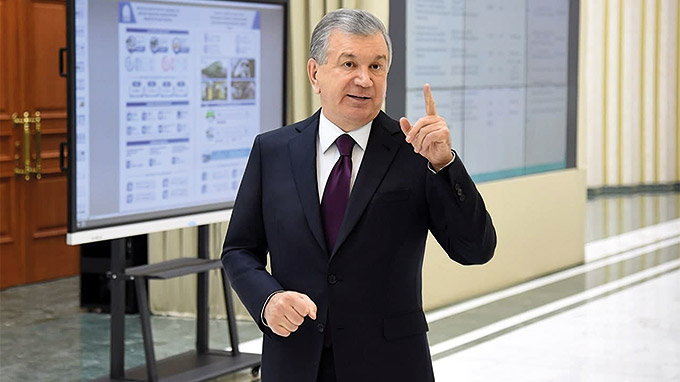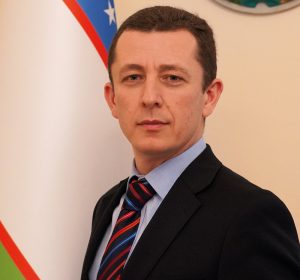Uzbekistan’s Dynamism Presents New Opportunities for Post-Brexit Britain
Though 5,000 km apart, the UK, an economic leader in the world, and my emerging but fast-developing nation are quietly forming a partnership no-one could have imagined three decades ago, when Uzbekistan broke away from the crumbling Soviet Union. I doubt anyone could have imagined it even five years ago.

President of Uzbekistan: Shavkat Mirziyoyev
The politics and international perspectives of both nations have profoundly changed. Post-Brexit Britain is eager for new friends and alliances. Under the reformist leadership of President Shavkat Mirziyoyev, Uzbekistan, too, is reaching out, resolving old arguments and finding common cause with its Central Asian neighbours and assuming a more active role in global affairs.
In my embassy, we see the results of the British changes on an almost daily basis. A few months ago, we were arranging a cultural webinar about the 15th Century Uzbek poet Alisher Navoi – our Shakespeare. One of my colleagues had the ambitious idea of trying to enlist some British politicians to recite passages from Navoi’s works in translation. Astonishingly, a dozen MPs and peers volunteered, and demonstrated genuine enthusiasm for their roles as interpreters of an ancient and, for them, exotic literary art form. A resulting video became a viral hit back home in Tashkent.
“All these seemingly disparate changes have a common theme: Uzbekistan is reviving its centuries-old role as an international crossroads.”
The UK-Uzbekistan relationship is developing in several ways. British historians and archaeologists are exploring our ancient role as a crossroads for trade between East and West, while financial and legal experts are contributing to plans to create a similar role for the future.
Following his election in December 2016, President Shavkat Mirziyoyev set in motion a series of reforms. Make the private sector the driving force for the national economy, instead of the state; encourage competition; democratise and encourage development of civil society; open borders and reduce or eliminate visa requirements; liberalise the currency, and bring in fundamental education reforms.
We were to welcome foreign investment and bring economic regulation up to international standards. Mandatory labour in our cotton fields, which had drawn international criticism, was banned.
The president’s foreign policy objectives involved similarly dramatic changes. He set about improving relations with Uzbekistan’s neighbours and travelled the world to meet face-to-face with global leaders. His goal was to persuade them of the sincerity, and permanence, of his reforms. If there had been any doubts about the priority given to human rights issues, President Mirziyoyev sought and secured election to the UN’s 47-member Human Rights Council.
All these seemingly disparate changes have a common theme: Uzbekistan is reviving its centuries-old role as an international crossroads. The country is championing the reinstatement of close trade and transport links, people-to-people connections between Central and South Asia.
Mirziyoyev’s focus on regional unity has changed the calculus across the region, and in Afghanistan. He has put enormous effort into bringing peace to Afghanistan – a bridge between two regions. He appointed one of our most senior diplomats as his Special Representative on Afghanistan. Our officials have been helping to bring the Afghan factions to the negotiating table in Doha, and to nudge all parties towards peace. Meanwhile, we have reached a regional consensus on a major transportation and trade corridor through Afghanistan.
And what of the UK’s role in achieving the aims of Uzbekistan’s new development strategy? From my London vantagepoint, I can say with some pride that it has been significant. One of the president’s key advisors on economic and governance reforms, Sir Suma Chakrabarti, is British, and a former EBRD president. TheCityUK, an organisation representing the UK’s expertise in international finance, is finalising the concept for the creation of a Tashkent International Financial Center (TIFC). Among the considerations is the adoption of English Common Law, potentially with wider application in domestic dispute resolution.
“London is providing assistance to the implementation of economic reforms in Uzbekistan through the Effective Governance for Economic Development in Central Asia (EGED) programme, in partnership with the World Bank.”
Most importantly, British education would be valuable for developing human capital and the capacity building much needed for delivering the reforms. We have already achieved some success in this. Throughout the country, special Presidential Schools are being opened, based on British education standards. Several higher education projects are under way, opening joint universities, launching double degrees and research programmes. We are receiving UK technical and advisory support for membership in the World Trade Organisation, a key step towards our embrace of world standards.
London is providing assistance to the implementation of economic reforms in Uzbekistan through the Effective Governance for Economic Development in Central Asia (EGED) programme, in partnership with the World Bank. We are interested in getting access to the UK’s Generalised System of Preferences (GSP) Enhanced Framework – an equivalent to the GSP+ agreement recently signed with the EU.
It’s not all plain sailing, of course. The UK government allocated £1.25bn in export credits for trade finance, particularly in the energy sector. A few weeks ago, the UK’s Trade Secretary Liz Truss wrote the UK Export Finance agency, setting energy renewables as a key priority. This is a key priority for Uzbekistan too, as we drive to keep to our Paris Agreement commitments on climate change.
Unfortunately, there has been little take-up on the UK side, with much of the work on Uzbekistan’s solar and wind power projects being undertaken by Middle Eastern, EU and American players. We would like to see more British participation in this.
Once the pandemic has been brought under control, and physical meetings and travel are once again possible, I am confident we will.

Author: Said Rustamov, Ambassador of the Republic of Uzbekistan to the UK
You may have an interest in also reading…
IMF Support for Sri Lanka’s Economic Reform Programme
An IMF staff mission visited Colombo January 30 – February 13 to discuss possible financial support for Sri Lanka’s economic
World Bank Group: “Customer is King” – Toward More Effective Development?
“Customer is King” is an old business saying that accentuates the importance of customers in every business. The private sector
Evan Harvey, Nasdaq: Where the Market Stands
The stock exchange industry has been increasingly active in advocating for smart and strategic disclosure of environmental, social, and corporate


















































































